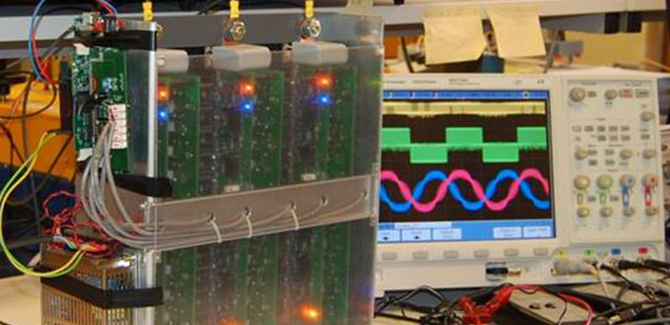Lectures 24 h
Exercises 20 h
Web task 10 h
Laboratory class 2x4 h
Project 15 h
EJ2301 Power Electronics 6.0 credits

Electricity plays a vital role in supplying energy to computers, electronics, industrial processes, trains and many other applications. They all have in common that the electrical energy has to be converted and controlled in a precise manner.
This course provides in depth knowledge of power converter topologies, their characteristics and principles for their control. The course also covers the basics of modern power semiconductors.
Information per course offering
Information for Autumn 2026 Start 24 Aug 2026 programme students
- Course location
KTH Campus
- Duration
- 24 Aug 2026 - 23 Oct 2026
- Periods
Autumn 2026: P1 (6 hp)
- Pace of study
50%
- Application code
11008
- Form of study
Normal Daytime
- Language of instruction
English
- Course memo
- Course memo is not published
- Number of places
Min: 1
- Target group
- Open for all master's programmes as long as it can be included in your programme.
- Planned modular schedule
- [object Object]
- Schedule
- Schedule is not published
Contact
Course syllabus as PDF
Please note: all information from the Course syllabus is available on this page in an accessible format.
Course syllabus EJ2301 (Autumn 2025–)Content and learning outcomes
Course disposition
Course contents
Today electricity plays a central role when providing energy to computers, electronics, industrial processes, and trains. They have in common that the electric energy must be converted and controlled accurately. This course provides a deep understanding of the function of power converters, structure and how they are controlled. The course also covers the basics of modern power semiconductor devices
Intended learning outcomes
After passing the course, the student shall be able to
- describe the function of DC-DC converters, line-commutated converters, switch-mode inverters, and switch-mode power supplies by means of basic equations for inductances and capacitances
- calculate average values, RMS values, ripple and fundamental components of voltages and currents
- calculate instantaneous values, average values, active, reactive, and ripple powers of above-mentioned power converters
- describe different operation modes for above-mentioned power converters and decide whether the converter works in continuous or discontinuous operation mode if applicable
- schematically describe the control of the power converter
- describe the function of power semiconductor devices and how they are controlled and be protected
- describe the function of a DC motor
- dimension a step-down DC-DC converter both electrically and thermally such that given specifications are fulfilled
- apply state-space averaging to control a step-down DC-DC converter
in order to
- learn tools to describe and analyse circuits and control methods for power converters
- be able to describe and apply power semiconductor devices and their control and protection circuits.
To obtain higher grades, the student shall be able to
- analyse the function of DC-DC converters, net commuted converter, switch-mode inverters, and switch-mode power supplies to decide limits for discontinuous operation, evaluate multi-quadrant operation and decide values for circuit element such that given specifications for stationary and transient operation are fulfilled
- analyse complex waveforms for convert quantities by means of Fourier analysis such that harmonics and their impact on the operation can be evaluated
- analyse transient operation of DC-DC converters, line-commutated converters, switch-mode inverters, switch-mode power supplies, and DC motors by means of linear ordinary differential equations
- calculate magnetomotive forces, flux densities, magnetic fluxes, inductances and winding turns of magnetic circuits that are exposed to quantities from power converters
Literature and preparations
Specific prerequisites
Knowledge in Electric Power Systems, 6 higher education credits, corresponding to completed course EJ1200.
Recommended prerequisites
EJ1200 Electric Power Systems basic course or equivalent.
Literature
Examination and completion
Grading scale
Examination
- PRO1 - Project Work, 1.0 credits, grading scale: P, F
- LAB1 - Laboratory Class, 0.5 credits, grading scale: P, F
- XUP1 - Web-based Module, 0.5 credits, grading scale: P, F
- TEN2 - Written exam, 4.0 credits, grading scale: A, B, C, D, E, FX, F
Based on recommendation from KTH’s coordinator for disabilities, the examiner will decide how to adapt an examination for students with documented disability.
The examiner may apply another examination format when re-examining individual students.
If the course is discontinued, students may request to be examined during the following two academic years.
Examiner
Ethical approach
- All members of a group are responsible for the group's work.
- In any assessment, every student shall honestly disclose any help received and sources used.
- In an oral assessment, every student shall be able to present and answer questions about the entire assignment and solution.
Further information
Course room in Canvas
Offered by
Main field of study
Education cycle
Supplementary information
In this course, the EECS code of honor applies, see:
http://www.kth.se/en/eecs/utbildning/hederskodex.